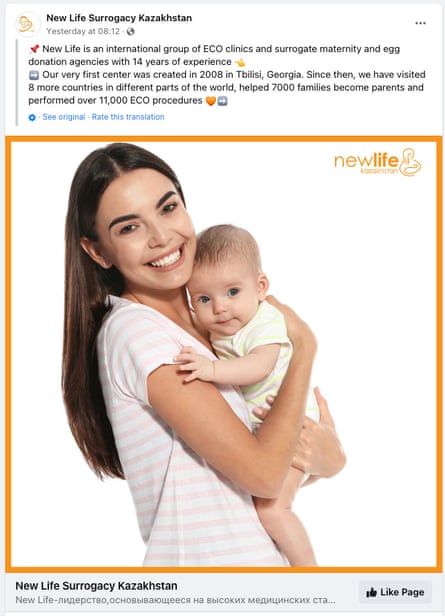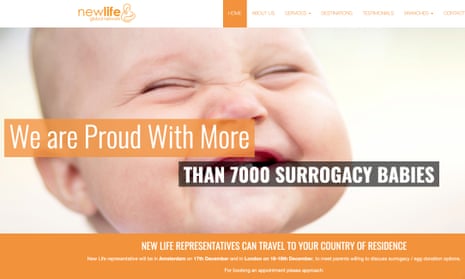Women recruited by an international surrogacy agency to carry babies for wealthy clients are being asked to undergo “unethical” medical procedures that increase their risk of serious complications, an investigation suggests.
New Life Global claims to have brokered more than 7,000 cross-border deals between clients mostly based in the UK, western Europe and North America and surrogates in countries including Mexico, Colombia, India, Ukraine and Georgia.
Facebook adverts offer women the chance to earn life-changing money to be surrogates, while marketing says “commissioning parents” including same-sex couples and those struggling with fertility problems are “guaranteed” a baby.
But a joint investigation by international media outlets including the Observer, funded by the Pulitzer Center and coordinated by Finance Uncovered, has found evidence of ethically questionable and potentially illegal practice by the agency, which has a UK-registered firm and offices around the world. New Life denied the allegations, saying it has helped thousands of couples “achieve their goals” and operates in full compliance with local laws.
Analysis of marketing materials, contracts and other documents suggests the company has for years taken advantage of lax regulation in developing countries to offer controversial services to clients not available to them in their home countries.
Websites for several New Life branches, including those in Georgia and Ukraine, promote multi-embryo transfer, which involves two or three embryos being implanted into surrogates and increases the chance of twins or triplets being born.
Experts say this practice carries a heightened risk of maternal mortality. It is not widely available in the UK, with triple embryo transfers banned in all but exceptional circumstances.
New Life branches, including those in Asia, Mexico and Ukraine, which is currently closed due to the war, also allow or have recently allowed clients to select the sex of their baby. Clients might want to do this “to balance the gender in the family”, to prevent genetic disorders linked to a particular sex and to meet “cultural and social norms”, its website says.
While permitted in those New Life locations, sex selection for non-medical reasons is banned in Australia, Canada, the UK and other countries in Europe. The Human Fertilisation and Embryology Authority, which regulates fertility clinics in the UK, said it had no control over treatments offered abroad but described the findings as “extremely concerning”.

It said selecting the sex of a child for any reason other than preventing serious inherited illness was allowed in some countries but “strictly prohibited by UK law”, and that the offer to implant multi embryos was “deeply worrying”. “A multiple pregnancy increases the risk of stillbirth, neonatal death and disability. Risks to [the surrogate] include late miscarriage, high blood pressure, pre-eclampsia and haemorrhage,” it said. There is no suggestion the practices were offered in the UK.
Separate evidence suggests New Life may have flouted UK laws when brokering agreements linked to its London-registered entity, New Life Global Network LLP. While altruistic surrogacy is permitted in the UK, commercial surrogacy is banned, with those brokering or offering to negotiate surrogacy arrangements for profit risking a three-month prison sentence and unlimited fine.
New Life is registered in the UK and says on its website that it is headquartered in London. It is actively offering to “meet parents willing to discuss surrogacy/egg donation options” in the UK and has issued contracts bearing the name of its UK entity.
Three legal experts who reviewed New Life contracts said they believe the firm may have violated UK laws.
Dr Kirsty Horsey, an expert in surrogacy law at Kent University, said: “The terms of the agreement are: you will find me a surrogate and I will pay you money for it,” which she said appeared to be a “criminal activity on their part”. Professor Emily Jackson, an expert in medical law and ethics at the London School of Economics, said the documents looked “really concerning”, adding: “I would avoid this [agency] with a bargepole.”
Founded in 2008 by Georgian doctor Mariam Kukunashvili, New Life Global offers low-cost surrogacy to international clients, many of whom live in countries where surrogacy is illegal, prohibitively expensive or the number of surrogates is limited.
In the UK, commercial surrogacy is banned but altruistic surrogacy is permitted and surrogates can be paid reasonable expenses. An historic lack of surrogates has driven some to look abroad. In 2020-21, more than 300 applications for parental orders were made, around half of which were international surrogacy arrangements.
With “hundreds of employees” worldwide and at least 16 active websites advertising services in 10 languages, New Life is a major agency catering to the demand and boasts of a “world renowned reputation”.
The women it recruits as surrogates typically come from lower income countries where regulation is nonexistent or relaxed. The amount they can earn ranges but Facebook ads recruiting New Life surrogates in Colombia last year said they would receive $12,000.
Legal experts believe New Life’s decision to operate in “grey markets” where surrogacy is neither legal or illegal leaves both surrogates and commissioning parents exposed. In these countries surrogacy agreements are unlikely to be enforceable by law, they say. In the UK, all surrogacy agreements are legally unenforceable.
New Life has previously said lax regulation allows it to operate with more freedom. The website for its former Kenya branch, which has now been removed, said the absence of “strict criteria and legal restrictions” in the country allowed it to provide “the best possible service to our intended parents by adjusting to patient individual needs in a very flexible and comfortable manner”.
In an extreme example, its branch in Ukraine previously suggested babies born with disabilities could be legally abandoned at an orphanage if they were unwanted, telling potential customers from overseas that, in the event of their surrogate giving birth to a baby with an “anomaly”, they “have a right to leave the baby” at an orphanage. “In this case government dedicated office from government side undertakes the responsibility toward baby and no lawyer is needed for this,” an FAQ page told customers until 2015.
This weekend, New Life Global denied claims of unethical practice and said all its branches operate in jurisdictions where commercial surrogacy is legal. After being contacted for comment, the company removed a section on its Georgian website that said it recommended multiple embryo transfer. The site for its Ukraine branch continues to promote the procedure, telling clients that “generally, it is a good practice to transfer more than 1 embryos (2 or 3 ) at a time”.
David Bezhuashvili, the firm’s owner and husband of Mariam Kukunashvili, its founder, said the materials were out of date.
“The guideline for multiple embryo transfers has been changed ... and companies under New Life strictly follow the rules on one embryo transfer,” he said.
“We have assisted many people to overcome poverty and earn a living,” Bezhuashvili added. “We have made our worthy contribution to the cause of human importance.”
The company did not answer questions about its UK operations or the enforceability of contracts issued by its London registered company, which it said “acts as an international marketing and promotion tool” for affiliates around the world.
“Due to the limited functions of the company in respect of marketing and promotion, the ownership structure has been simplified by top management,” Bezhuashvili added. Financial statements filed by the company in October show it reported earning £343,000 in commission in 2021-22, more than double the year before.
The Department of Health said it was assessing evidence passed to it by the Observer and would refer it to relevant authorities if it appeared that UK laws on commercial surrogacy were being broken.“We encourage people considering surrogacy to remain in the UK, take independent legal advice and use recognised UK-based surrogacy organisations,” it said.
